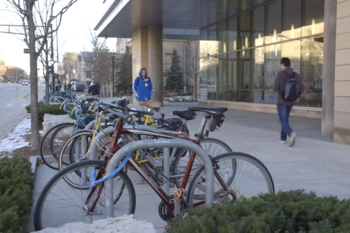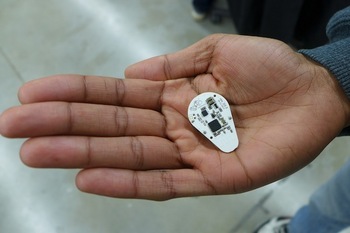Internet of Things Lab focuses on tech-savvy inventions
If six young technologists at the University of Wisconsin–Madison have their way, bike thieves around campus will face a new obstacle: bikes capable of “talking” to Internet-connected bike racks.
The Bike Recovery Network is one of 17 teams at the Internet of Things Lab, which will present the results of one concentrated semester of effort at an open house Tuesday evening.
In the Bike Recovery Network’s still-developing system, a radio-frequency identification tag hidden on a bike will communicate with a smart phone that registers when the bike enters and exits the area. Either event triggers a message to a web server that is then texted to the bike owner.

The Bike Recovery Network system would tell when a protected bike is left at or taken from a “smart bike rack.”
Photo: Justin Bomberg
When the bike leaves the area without the owner’s knowledge, the police department is automatically alerted to the theft. Best of all, on a campus where startlingly few stolen bikes are returned, is the potential for getting the bike back.
“If the thief brings the bike to a smart bike rack,” says team member Akhil Sundararajan, a mechanical engineering grad student, “you’ll immediately know the bike is there, and the web server will immediately notify the authorities, and you can get your bike back.”
The Internet of Things Lab is a campus hub designed to bring teams together around projects, says Sandra Bradley, the lab’s director of research for consumer and retail applications. “Graduate and undergraduate students come from across campus — computer science, engineering, business, communication and retail — and they are able to work on the things they find interesting. “
In the fall semester, the second time the Internet of Things Lab event was held, 40 students worked on 17 project teams.

A radio-frequency identification tag will communicate with a smart phone that registers when the bike enters and exits the area.
Photo: David Tenenbaum
It’s unrealistic to expect a prototype in a single semester, Bradley says. “The goal is more ideation and exploration; it’s not really about product design. We like to see the students innovate and come up with ideas that could then be taken to the next stage.”
One idea that is moving quickly toward the market will not be on display Tuesday. The MedCuff group, which began during the first Internet of Things Lab, is developing a device to ensure that users take prescriptions. “This semester, the three-student team is refining their project, getting input from industry and meeting with investors,” Bradley says.
Cash prizes funded by We Energies, American Family Insurance, and Terso Solutions will be awarded at the open house. “We encourage student to think about the meaningfulness of their ideas,” says Bradley, “so one prize will be given for the biggest impact on society.”
“We have to think how this would actually benefit people,” says Daniel Chao, a member of the bike group and an undergraduate in industrial and systems engineering. He says the lab functions as a magnet for talent, ambition and expertise.
“We like to see the students innovate and come up with ideas that could then be taken to the next stage.”
Sandra Bradley
“I’ve learned how to work with people with different skills, especially how to make quick and effective decisions under time pressure,” Chao says. His group also includes Reed Kinning, Keshav Mathur, Dave Sescleifer and Ricki Xie.
The lab supports students in innovative thinking and entrepreneurship, says Bradley. “It’s very gratifying to hear them talking about the lab, about the opportunity to work and explore across disciplines, to take part in innovation and entrepreneurial thinking.”
At the root, however, is passion, she explains. “These teams are working on projects that they are passionate about. And even more than a technology sandbox, this is a place for encouraging students to think through real-world problems and to have hands-on experience with cutting edge technologies.”
Tags: engineering, Internet, research, technology




